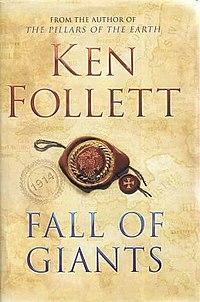Fall of Giants (novel)

First edition cover
|
|
| Author | Ken Follett |
|---|---|
| Country | United Kingdom |
| Language | English |
| Series | Century Trilogy |
| Genre | Historical Novel |
| Publisher | Pan Macmillan |
|
Publication date
|
2010-09-28 |
| Media type | Print (paperback and hardcover) Ebook Audiobook. |
| Pages | Hardcover, 1008 pp |
| ISBN | |
| Followed by | Winter of the World |
Fall of Giants is a historical novel published in 2010 by Welsh-born author Ken Follett. It is the first in the Century Trilogy, and follows five interrelated families throughout the course of the 20th century. The first book covers notable events such as World War I, the Russian Revolution, and the struggle for women's suffrage. The sequel Winter of the World covers World War II and was published on September 18, 2012. The third book, Edge of Eternity, covers the Cold War and was published in 2014.
The novel begins with the thirteen-year-old Billy Williams, nicknamed Billy Twice, going to work his first day in the coal mine underneath the fictional Welsh town of Aberowen in 1911.
Three years later, the main story begins. Edward "Fitz" Fitzherbert, Earl Fitzherbert, who maintains a country estate in Aberowen and licenses the land on which the coal mine is built, hosts a party for many powerful people around the world. His guests include:
Major characters introduced after the party include Grigori and Lev Peshkov, two Russian orphans who work in a locomotive factory and have personal reasons to hold a grudge against Princess Bea and the rest of the Russian royal family. Grigori and Lev's father was executed by Bea's aristocratic family for alleged improper grazing of cattle on Bea's family's land.
The overall theme of the novel revolves around common people trying, and many times succeeding, in throwing off the yokes so often placed on them by a society (largely focused on Britain and Russia) dominated by the landed aristocracy.
There are several key themes in this novel. Follett has done a remarkable job in linking several key facets in world history at this point. They include the causes of the 1st World War, the collapse of Imperial Russia, and Germany's role in the continuance of a bloody war that led to economic collapse and the rise of Hitler.
Regarding Russian history, he portrays Lenin's role in the rise of the Bolsheviks as a ploy of the German intelligence service as an attempt to divide and conquer Russian resistance on the eastern front. He does not clearly explain the rise of Stalin as Lenin died. This may be better explained in the second volume (he does this at about page 500 of Volume 2, which seems to understate the role of Stalin in Europe and US history).
...
Wikipedia
